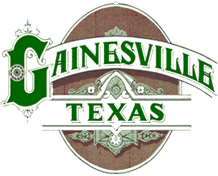HISTORIC DOWNTOWN GAINESVILLE
ARCHITECTURE & HISTORY
Gainesville's downtown commercial architecture is predominantly from the
early 1880's with a sprinkling of buildings from the turn of the century
and 1950's when a movement to modernize was prevalent. A new program, Legends
and Lore of Gainesville, will launch this fall providing visitors to downtown
an opportunity to learn about the history of each participating building.
It will encompass the architectural history, business history and many stories
about the events and people that took place in years past. There is much
to explore in our historic downtown.
Throughout the 1870's and 1880's the words cattle and prosperity were synonymous
to the people of Gainesville. Gainesville was officially incorporated in
1873 and grew into a bustling, booming cow town. By the early 1880's the
Gainesville National Bank, the Lindsay National Bank and the Red River National
Bank held millions of dollars deposited by cattle barons from all over North
Texas. Cattle money financed the construction of the new county courthouse
in 1878 and provided the tax revenue to support local schools and the building
of public roads. There was also the more sordid side of the cattle frontier.
For accompanying the seemingly endless longhorns came their rowdy drivers.
Today as you walk down North Commerce Street you can still see the faint
writing identifying the buildings that housed saloons. North Commerce was
off limits to children then as the street was filled with saloons and brothels.
The building on the corner of North Commerce and California Street housed
the Grand Saloon, owned by Mr. Hossapple. The upstairs had been untouched
for over a century with the thin walls of the numbered rooms intact. This
building is being converted into a restaurant and bed and breakfast named
for the saloon owners wife, Sarah. Several of the buildings along Commerce
Street have history such as this and many second stories are still intact
from the turn of the century.
Further down on East California is the Lindsay House. During this time
countless business transactions took place, enormous amounts of cash and
huge tracts of land changing hands like the playing cards and drinking glasses
in the plush hotel barroom. As many as fifty cattlemen who ranched in the
ranges throughout North Texas and the Panhandle listed their business address
as Gainesville. Many cowmen resided in Gainesville in the stately and palatial
Victorian homes they built. Recognizing the importance of Gainesville as
a vital center in the cattle trade, the Cattle Raisers Association held
their annual conventions at the Lindsay Hotel in 1882 and 1888. When a local
resident who would be hosting the event confirmed the date she immediately
ordered a new gown from Paris at a cost of $1,500 (in 1888.) Today the Lindsay
Hotel houses Powell Fine Art and much of the first floor structure is in
place. The third story was lost long ago.
The majority of buildings lining North, West and South sides of the courthouse
square were built in the early 1880's. Businesses have changed throughout
the years but what remains is the original tight design of the square. The
courthouse is the fourth courthouse to be built on the square. The original,
a log structure, was destroyed when an errant bull was distressed by flies
and inadvertently entered the courthouse. The courthouse today is of Beau
Arts design with a large clock tower, built in 1911. Guided tours are conducted
every Friday at Noon.
If you travel down Dixon Street to Pecan St. you will see what is now the
Morton Museum. Built in 1884, this building originally housed City Hall,
the Fire Station and the Jail. Only the first story remains of what were
originally two stories with a tower.
Continue down Dixon to the south and follow the signs guiding you through
our historic home neighborhood.
There is so much history in our downtown. The restored Santa Fe Depot and
Harvey Girls display, Tyler Simpson building (what we refer to as the first
drive through in Texas), State Theater, Butterfield Stage and spectacular
churches. We can go on and on. The Morton Museum is a wonderful way to begin
your tour of Gainesville as they can provide information, brochures and
walking tour information. They can be reached at 940-668-8900.
City of Gainesville, Texas
http://www.gainesville.tx.us

